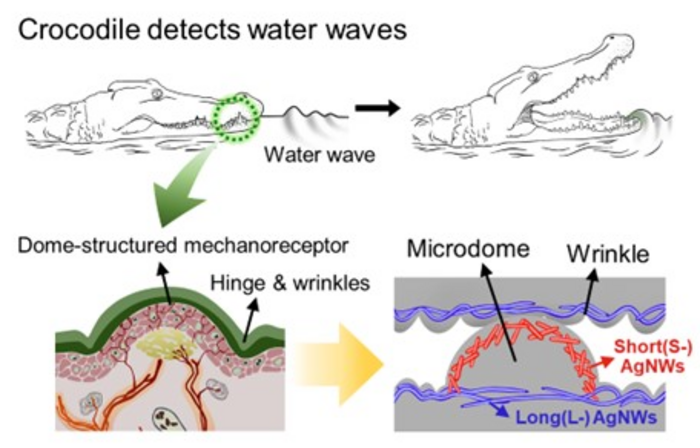The development of electronic skin with multiple senses is essential for various fields, including rehabilitation, healthcare, prosthetic limbs, and robotics. One of the key components of this technology is stretchable pressure sensors, which can detect various types of touch and pressure. Recently, a joint team of researchers from POSTECH and the University of Ulsan in Korea has recently made a significant breakthrough by successfully creating omnidirectionally stretchable pressure sensors inspired by crocodile skin.

Credit: POSTECH
The development of electronic skin with multiple senses is essential for various fields, including rehabilitation, healthcare, prosthetic limbs, and robotics. One of the key components of this technology is stretchable pressure sensors, which can detect various types of touch and pressure. Recently, a joint team of researchers from POSTECH and the University of Ulsan in Korea has recently made a significant breakthrough by successfully creating omnidirectionally stretchable pressure sensors inspired by crocodile skin.
The team behind the research was led by Professor Kilwon Cho, Dr. Giwon Lee, and Dr. Jonghyun Son from the Department of Chemical Engineering at POSTECH, along with a team led by Professor Seung Goo Lee from the Department of Chemistry at the University of Ulsan. They drew inspiration from the unique sensory organ of crocodile skin and developed pressure sensors with microdomes and wrinkled surfaces. The result was an omnidirectionally stretchable pressure sensor.
Crocodiles, formidable predators that spend most of their time submerged underwater, possess a remarkable ability to sense small waves and detect the direction of their prey. This ability is made possible by an incredibly sophisticated and sensitive sensory organ located on their skin. The organ is composed of hemispheric sensory bumps that are arranged in a repeated pattern with wrinkled hinges between them. When the crocodile moves its body, the hinges deform while the sensory part remains unaffected by mechanical deformations, enabling the crocodile to maintain an exceptional level of sensitivity to external stimuli while swimming or hunting underwater.
The research team has successfully mimicked the structure and function of the crocodile’s sensory organ to develop a highly stretchable pressure sensor. By inventing a hemispheric elastomeric polymer with delicate wrinkles containing either long or short nanowires, they have created a device that outperforms currently available pressure sensors. While other sensors lose sensitivity when subjected to mechanical deformations, this new sensor maintains its sensitivity even when stretched in one or two different directions.
Thanks to the fine wrinkled structure on its surface, the sensor can maintain high sensitivity to pressure even when subjected to significant deformation. When an external mechanical force is applied, the wrinkled structure unfolds, reducing stress on the hemispheric sensing area that is responsible for detecting applied pressure. This stress reduction enables the sensor to preserve its pressure sensitivity even under deformations. As a result, the new sensor exhibits exceptional sensitivity to pressure, even when stretched up to 100% in one direction and 50% in two different directions.
The research team has developed a stretchable pressure sensor suitable for a wide range of wearable devices with diverse applications. To evaluate its performance, the researchers mounted the sensor onto a plastic crocodile and submerged it in water. Interestingly, the mounted sensor was able to detect small water waves, successfully replicating the sensing capabilities of a crocodile’s sensory organ.
“This is a wearable pressure sensor that effectively detects pressure even when under tensile strain,” explained Professor Cho who led the team. He added, “It could be used for diverse applications such as pressure sensors of prosthetics, electronic skin of soft robotics, VR, AR, and human-machine interfaces.”
The study was conducted with the support from the National Research Foundation of Korea under the Ministry of Science and ICT and the Key Research Institutes in Universities program under the Ministry of Education. The paper outlining the research results was featured on the cover of Small, one of the most prestigious scientific journals covering material science, as well as in Advanced Science News, an open-access journal published by Wiley.
Journal
Small
DOI
10.1002/smll.202270287
Article Title
Crocodile-skin-inspired omnidirectionally stretchable pressure sensor
Article Publication Date
28-Dec-2022




